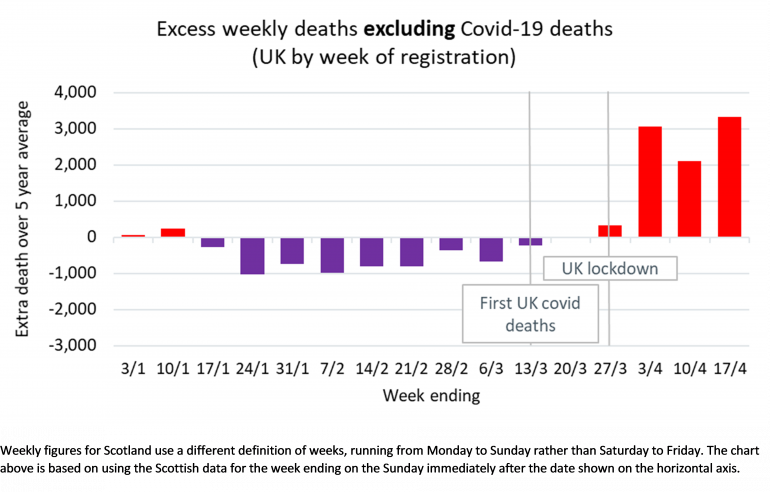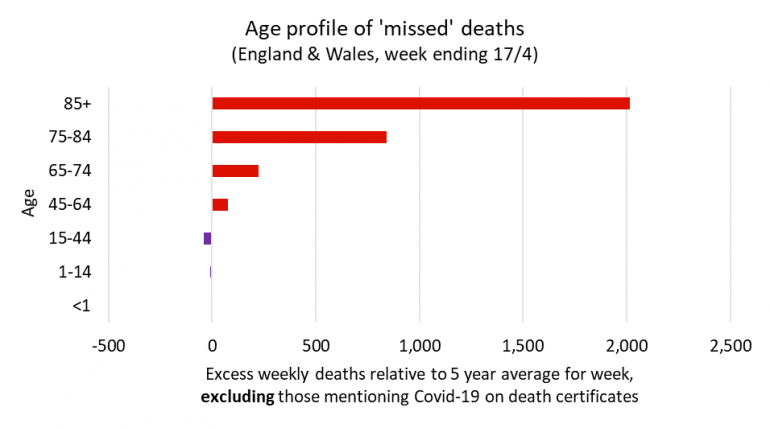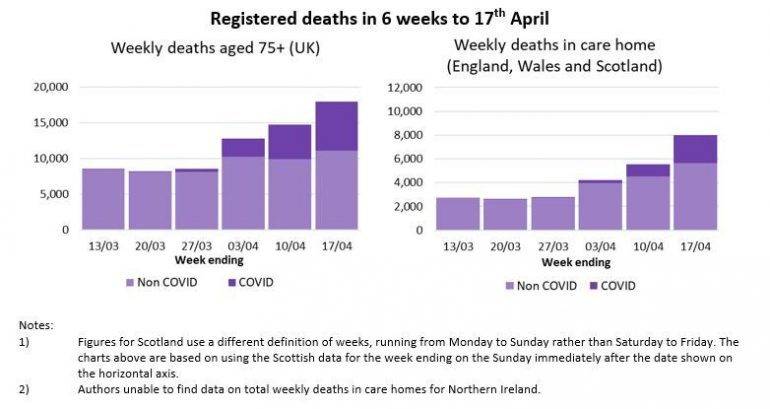Yesterday we discussed how the daily Downing Street briefings are limited to “hospital” deaths, and generally only include those who have tested positive for Covid-19. As such these daily tallies omit a large number of deaths likely to be directly Covid-19 related.
Looking at recently published data from the UK’s national statistics agencies we identified that including deaths where Covid-19 is mentioned on the death certificate, regardless of location, is likely to increase the deaths linked to Covid-19 by over 60%. Put another way, last night’s Downing Street briefing headline of 21,676 deaths (28th April) probably means that we have already seen some 34,000 deaths directly linked to Covid-19.But that is only part of this depressing story. Deaths which do not mention Covid-19 on the death certificate have also risen markedly in recent weeks. In this blog we explore these “missed” deaths and ask whether they might be indirectly related to Covid-19…
A good start to the year, gone bad
In the early weeks of 2020 there was much to celebrate in the emerging UK statistics. The numbers dying each week were lower than the average for the comparable weeks over the last 5 years (2015-2019). This “excess death” measure is a simple way of understanding emerging patterns. Generally, an ageing population means that we would expect death numbers to go up slightly year-on-year. That the early weeks were (nearly) all showing decreases (purple bars in the chart below) was good news – consistent with a benign winter and flu season compared to recent years. By mid-March we had seen a total of nearly 5,000 fewer deaths than average over the last 5 years.
The following weeks saw a rapid rise in deaths as the Covid-19 pandemic took hold. However, even if we strip out those deaths where Covid-19 has been mentioned on the death certificate, it is clear that death registrations are materially up compared to those seen in recent years (red bars in the chart below).

Between mid-March and 17th April we saw almost 9,000 “excess deaths” (excluding Covid-19 deaths). Mortality has been 20% higher over these 4 weeks than recent years. Such a large step increase, at the same time as we are seeing the emerging Covid-19 deaths and experiencing lockdown, seems too much to be purely coincidental.
We refer to these as the tragic “missed” deaths not captured in the official Covid-19 statistics. Including these, and the likely experience since 17th April, means there may be another 16,000 indirect deaths that have occurred thus far. Tragically the combined direct, and indirect, loss of life from Covid-19 may now already be 50,000 Britons.
What do we know about these “missed deaths”?
From exploring the data thus far, two emerging themes have struck us. Firstly, the deaths are not simply extra deaths across the ages. For example, we can look at how the “missed” deaths in the week ending 17th April are distributed across the age spectrum. The chart below shows this for England and Wales.

We have seen a modest reduction in deaths amongst children and younger adults; perhaps a consequence of lockdown and fewer accidental deaths from road accidents, alcohol abuse etc…?
The major source of the extra deaths, though, is the oldest ages – the over 75-year-olds. This suggests that social distancing and lockdown may be having a particularly acute impact on our older generations i.e. those with the co-morbidities associated with ageing (and so greater need for access to health and social care), who are in some cases socially isolated and so vulnerable, and for whom frailty will be more prevalent. Indeed, amongst the over 75-year-olds there has been a very material increase in weekly deaths since the start of the pandemic as illustrated below.

However, comparing the right-hand chart to the left-hand chart above we can see how the rise in non-Covid-19 deaths is more pronounced in care homes than the over 75 population in general. The issue of “missed deaths” seems to be particularly acute in care homes.
To some extent this is understandable – with care homes looking after the frailest older individuals. However, it lends support to the concerns being raised by those working in this sector.
Are these “missed deaths” Covid-19 related?
Although the deaths don’t specifically mention Covid-19 on the death certificate this does not exclude Covid-19 as the cause.
Some of these deaths may for example have been triggered by Covid-19, but not be classified as such, for instance if they were not symptomatic prior to death. There may also be some individuals for whom the co-morbidities were too complex for Covid-19 to be obvious.
Unreported “direct” deaths aside, it is also easy to postulate a host of reasons why Covid-19 may have had broader implications for health and welfare, leading to significant indirect deaths. Potential reasons include:
- Social isolation, particularly amongst older individuals, as a consequence of lockdown leading to fewer people “checking-in” on them;
- Vulnerable people being reluctant to seek medical assistance during the pandemic, e.g. for fear of Covid-19, or placing unnecessary strain on the health service;
- Skill shortages: stretched health and social care services as a consequence of redeployment of resources, or staffing issues owing to sickness/self-isolation and the challenges of delivering effective services in a socially distanced way;
- Disruption to routine testing, as laboratory capacity is redirected to Covid-19;
- Postponement of “routine” procedures leading to complications;
- Cancer Research is reporting that cancer treatments have been "severely disrupted”; and
- Mental health challenges of living with lockdown.
As greater detail emerges on the causes of death being listed on death certificates we may get more clarity. Meanwhile, these are sadly deaths which may have been avoidable, or would otherwise have not have happened for many months/years, were it not for Covid-19.
Unfortunately, it now seems likely that the UK’s Covid-19 death toll – direct and indirect – is already in excess of 50,000. Double the headline numbers in our media. The challenge ahead is, of course, to continue to save lives; not just those in hospital who have tested positive for Covid-19 but also those who are at risk of being added to the “missing” and “missed” deaths.
All of the team at Club Vita wish to extend our condolences to anyone who has personally been touched by bereavement in recent weeks. We know that these deaths leave behind people who are missing loved ones. Our thoughts are with you…
Join the discussion
Our Friends of Club Vita LinkedIn group brings together like-minded individuals with a shared interest in longevity. Share insights on longevity and connect with industry peers.





